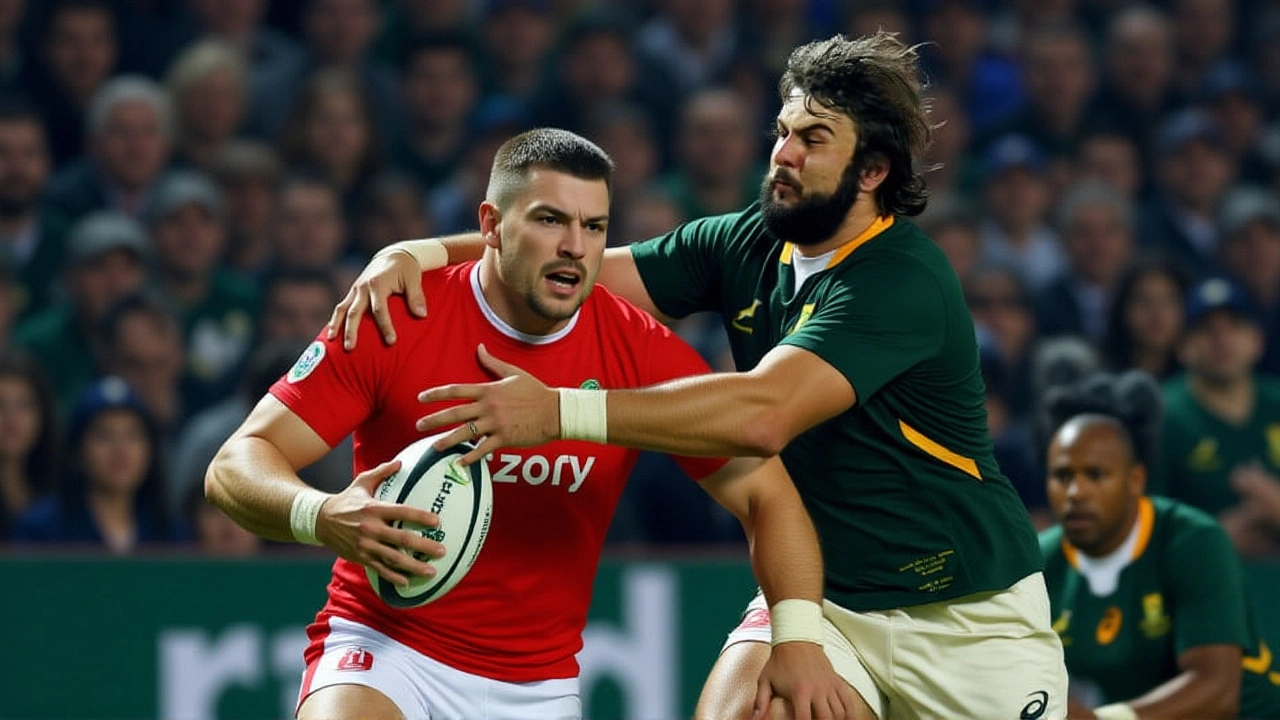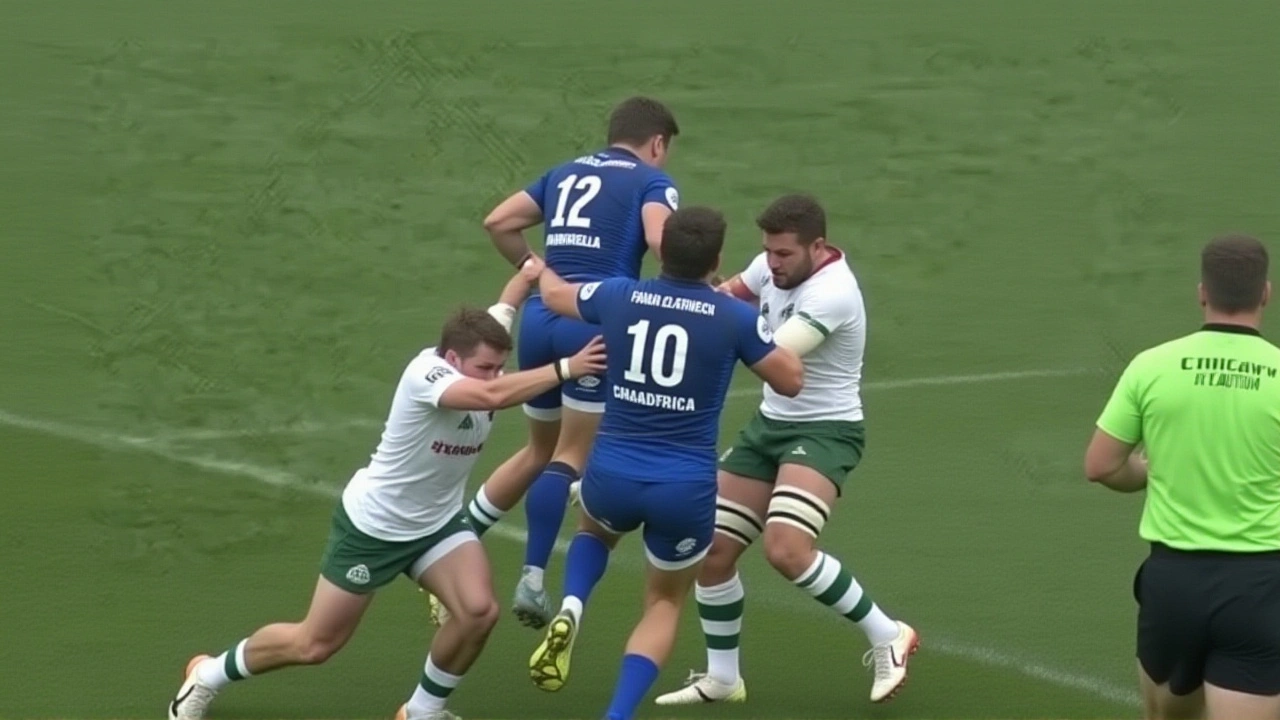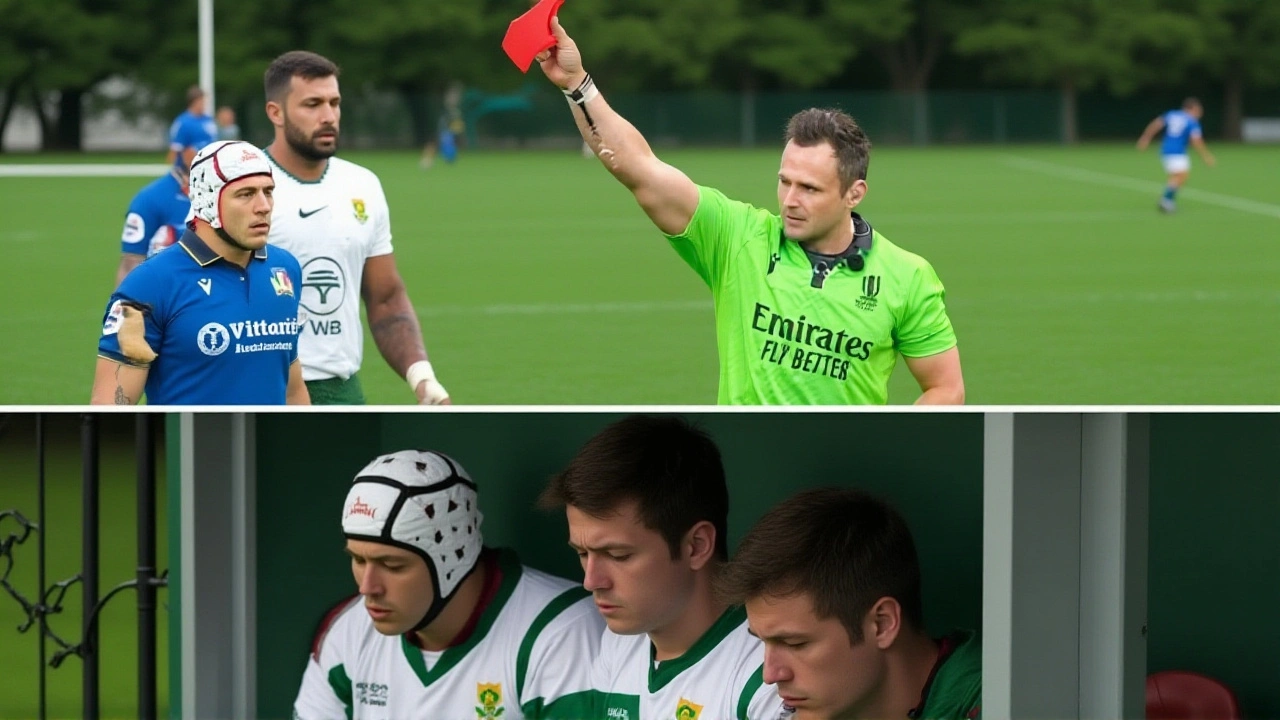When Franco Mostert dropped to his knees after a clean, textbook tackle on an Italian player during the November 18, 2025, rugby clash in Cape Town, he thought he’d done his job. Instead, the referee raised a red card — and the Springboks were left with 13 men on the field. What followed wasn’t just a moment of shock. It was the latest flashpoint in what South African rugby officials now call a systemic officiating crisis.
The Tackle That Sparked a Storm
The incident occurred in the 52nd minute of the Springboks’ 28-17 win over Italy. Mostert, the 36-year-old lock with 78 Test caps, closed down an Italian ball-carrier with perfect form: low shoulder, controlled head position, arms wrapped. But under World Rugby’s current head-contact protocols, even minimal contact to the head — no matter how incidental — triggers an automatic red card unless mitigating factors are proven. The referee, after consulting the TMO, ruled it a clear shoulder charge with no mitigation possible. “It’s not a tackle,” said one anonymous analyst on the Boks Unpacked X The Verdict YouTube breakdown. “It’s a tackle that got caught in the net of a rule that’s too rigid.” The video, viewed over 2.3 million times in 48 hours, compared the incident to five similar tackles in the same World Rugby tournament — all of which resulted in yellow cards, not reds.A Suspension That Never Was
The automatic entry point for such a foul? A 16-week suspension. That’s not a suggestion — it’s the rule. The South African Rugby Union immediately began preparing mitigation arguments, gathering video evidence, expert testimony, and even biomechanical analysis from sports scientists at the University of Cape Town. Three days later, the judicial panel overturned the red card, ruling the contact was “unintentional and unavoidable.” But the damage was done. The Springboks had already played 28 minutes with 13 men. Italy had scored two tries during that window. And the psychological toll? Unquantifiable. “You’re not just playing with fewer bodies,” said one veteran Springbok, speaking off-record. “You’re playing with the weight of knowing the system’s rigged against you.”Three Red Cards in a Row
This wasn’t an isolated incident. It was the third red card handed to a Springbok in three consecutive international matches — all under the same rulebook. In the previous game against France, flanker Jasper Wiese was sent off for a shoulder-to-head contact that, according to match footage, mirrored a similar incident involving French player Antoine Dupont in the same tournament — which resulted in a yellow card. A week before that, hooker Malcolm Marx received a red for a late hit on a scrum-half — a call that drew gasps from commentators who noted the tackle had been deemed legal in three prior matches. The South African Rugby Union filed an official complaint with World Rugby on November 18, 2025. Their argument? The rules are being applied inconsistently — and unfairly — to their players. “We’re not asking for special treatment,” said SARU’s Head of Compliance, Thabo Mokoena, in a statement. “We’re asking for equal treatment.”
World Rugby’s Silence
And yet, World Rugby — headquartered in Dublin, Ireland — has said nothing. No press release. No statement. No acknowledgment of the growing backlash. Even after Mostert’s red card was overturned, the governing body remained silent. Analysts call it a dangerous precedent. “When you have a rule that’s supposed to protect players, but you apply it like a scalpel in one case and a sledgehammer in another,” said former referee Nigel Owens in a BBC interview, “you don’t just lose credibility. You lose trust.” The irony? World Rugby’s own data shows a 42% drop in concussion incidents since 2017, thanks to stricter head-contact rules. But now, critics argue, the pendulum has swung too far. “We’ve gone from ‘if in doubt, sit them out’ to ‘if there’s breath, it’s red,’” said Dr. Lwazi Nkosi, a sports neurologist at Stellenbosch University. “It’s not protecting players anymore. It’s punishing them for playing the game.”What’s Next?
The Springboks’ management team is preparing to meet with World Rugby’s disciplinary committee in Dublin within the next 10 days. They’re not just asking for a review of Mostert’s case — they’re demanding a standardized, transparent framework for applying head-contact rules. They want video evidence from all similar tackles in the past six months to be made public. And they want a neutral panel of former players, referees, and medical experts to audit the current system. Meanwhile, the Boks’ next match — against New Zealand in Johannesburg — looms large. Fans are already planning protests outside Ellis Park. Social media is flooded with #FairPlayForBoks. And the message is clear: this isn’t just about one red card. It’s about whether the rules still serve the sport — or just the fear of lawsuits.
The Bigger Picture
Rugby has always been a brutal game. But over the last decade, it’s become a minefield of legal liability. Coaches now train players to avoid contact entirely — even when it’s the only way to stop a try. Tackles are becoming slower, less effective. The spectacle is fading. And the players? They’re caught in the middle. “The game is being killed by bureaucracy,” said former Springbok captain John Smit in a recent podcast. “We used to trust the referee. Now we’re watching the screen, waiting for the verdict. It’s not rugby anymore. It’s a courtroom with cleats.”Frequently Asked Questions
Why was Franco Mostert’s red card overturned?
The judicial panel ruled that Mostert’s tackle, while involving incidental head contact, met all technical criteria for a legal tackle under World Rugby’s guidelines — including proper entry angle, controlled body position, and no intentional targeting. Video analysis showed the contact was unavoidable given the speed and trajectory of both players, and no prior precedent existed for such a tackle to warrant a red card when no other foul was present.
How many red cards have the Springboks received in recent matches?
The Springboks received three red cards in three consecutive international matches in November 2025: Jasper Wiese against France, Malcolm Marx against Argentina, and Franco Mostert against Italy. Each incident involved head contact, but similar tackles by players from other nations in the same tournament resulted in yellow cards or no sanction at all, fueling claims of inconsistent enforcement.
What is World Rugby’s official stance on the controversy?
World Rugby has issued no public statement regarding the Springboks’ complaint or the overturned red card. Despite mounting pressure from fans, media, and former players, the organization has remained silent — a move critics say signals either indifference or an unwillingness to confront systemic flaws in its disciplinary process.
How has this affected the Springboks’ performance?
In the Italy match, South Africa played 28 minutes with 13 men after Mostert’s dismissal, allowing Italy to score two tries during that window. While the Boks still won 28-17, analysts believe the loss of defensive structure and morale cost them a dominant victory. More importantly, the psychological toll on players and coaching staff is now a major concern heading into high-stakes fixtures against New Zealand and Australia.
Are other teams raising similar concerns?
Yes. France and New Zealand have privately raised concerns about inconsistent red card applications in internal meetings with World Rugby. While neither has filed formal complaints, leaked internal memos show both teams have compiled evidence of similar tackles being treated differently across matches. The issue is becoming a global talking point — not just a South African one.
What changes could World Rugby make to fix this?
Experts suggest introducing a tiered sanction system: red cards only for intentional or reckless contact, yellow cards for incidental contact with no clear foul, and no sanction for unavoidable contact. They also recommend publishing all similar incidents from the past six months with their outcomes, creating transparency. A neutral review panel of ex-players, referees, and medics could help rebuild trust in the system.


Author
Ra'eesa Moosa
I am a journalist with a keen interest in covering the intricate details of daily events across Africa. My work focuses on delivering accurate and insightful news reports. Each day, I strive to bring light to the stories that shape our continent's narrative. My passion for digging deeper into issues helps in crafting stories that not only inform but also provoke thought.